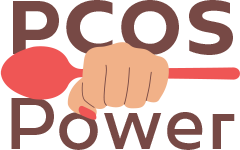Kimberly Singh, Julie’s resident nutrition grad student {{ also affected by PCOS! }} is back to blogging on PCOS topics. Enjoy!
What is inositol?
Inositol is a natural compound found in plants, animals, and humans. Inositol provides the foundation for inositol phosphates, which have many important roles in your body.
Fun fact: Inositol was once known as vitamin B8. It lost its vitamin status when scientists realized the body makes enough inositol that you do not have to worry about eating it, which is a requirement to be considered a vitamin.
How are inositol and PCOS related?
Research has found something fishy going on with inositol in people with PCOS. The exact occurrence is unknown, but there seems to be an imbalance or deficiency of inositol in people with PCOS. So, it’s no coincidence that some of inositol’s key functions overlap with PCOS symptoms. People with PCOS are likely to have insulin resistance and ovulatory dysfunction, and inositol is important for promoting healthy insulin-response systems and ovulatory function.
Inositol supplements are insulin sensitizers, making the cells more sensitive to insulin, allowing glucose to enter the cells. This is really important for people with PCOS, who are likely to be insulin resistant and have cells that are not sensitive to insulin, preventing glucose from entering the cells (more on PCOS and insulin here, background on insulin here).
It seems like inositol will be a major player in the future of PCOS treatment. Research has already found inositol to also have the following benefits in people with PCOS:
- Reduce insulin resistance
- Reduce androgen levels (such as testosterone)
- Decrease cardiovascular disease risk
- Increase ovulation frequency
- Improve oocyte and embryo quality
- Reduce metabolic syndrome
- Regulate menstrual cycles
- Reduce Hemoglobin A1c
Can you get inositol from food?
Yes, but it is difficult to get the correct dose from your food. The benefits of inositol in people with PCOS have been found with inositol supplementation. If you are still interested in foods that contain inositol, some great options are: Brazil nuts, almonds, walnuts, cantaloupe, citrus fruits, bran, oats, beans, and peas.
Are all inositol supplements the same?
NO! I don’t mean to shout, but really, they aren’t!
There are nine different forms of inositol, and two of those nine are most abundant in our bodies. These two inositol superstars are myo-inositol and D-chiro-inositol. Most supplements will contain either one of these or a combination of the two.
The benefits listed above were found with combination of the two forms of inositol in a 40:1 ratio of myo-inositol and D-chiro-inositol.
Which brand of inositol should I take?
Unfortunately, the supplement industry is not well regulated. This means that you have to be careful to use trusted brands. Julie recommends Theralogix Ovasitol inositol powder or Elan Healthcare’s Ovofolic inositol powder. These have that ideal 40:1 ratio that has been proven to help people with PCOS.
- Ovasitol can be ordered here by using Julie’s Provider code: 127403.
- Ovofolic can be ordered here and get 15% off using code pcospower at checkout.
How do I consume inositol powder?
The inositol will be proportioned in individual packets that contain 2,050 mg inositol in the 40:1 ratio. Consume two packets per day by dissolving the powder in a hot or cold liquid. The inositol powder is tasteless and odorless (thankfully).
Are there any side effects?
Research has not found side effects to inositol supplements.
Inositol has an exciting role in the future of PCOS treatment. Inositol is a great option for people who had negative side effects with Metformin. Some research even finds it to have better ovulation and pregnancy outcomes than Metformin.
References
Bizzarri, M., & Carlomagno, G. (2014). Inositol: history of an effective therapy for Polycystic Ovary Syndrome. European Review for Medical and Pharmacological Sciences, 18, 1896-1903.
Clements, R., Jr., & Darnell, B. (1980). Myo-inositol content of common foods: development of a high-myo- inositol diet. American Journal of Clinical Nutrition, 33(9), 1954-1967.
Colazingari, S., Treglia, M., Najjar, R., & Bevilacqua, A. (2013). The combined therapy myo-inositol plus d-chiro-inositol, rather than d-chiro-inositol, is able to improve IVF outcomes: results from a randomized controlled trial. Archives of Gynecology and Obstetrics, 288(6), 1405-1411. doi:10.1007/s00404-013-2855-3
Hamid, A., Mohamed, A., Madkour, I., & Wail, A. (2015). Inositol versus Metformin administration in polycystic ovary syndrome patients: a case-control study. Evidence Based Women’s Health Journal, 5(3), 93-98.
Kalra, S., Kalra, B., & Sharma, J. (2016). The inositols and polycystic ovary syndrome. Indian Journal of Endocrinology and Metabolism, 20(5), 720. doi:10.4103/2230-8210.189231
Minozzi, M., Nordio, M., & Pajalich, R. (2013). The Combined therapy myo-inositol plus D-Chiro-inositol, in a physiological ratio, reduces the cardiovascular risk by improving the lipid profile in PCOS patients. European Review for Medical and Pharmacological Sciences, 17(4), 537-540.
Monastra, G., Unfer, V., Harrath, A. H., & Bizzarri, M. (2016). Combining treatment with myo-inositol andD-chiro-inositol (40:1) is effective in restoring ovary function and metabolic balance in PCOS patients. Gynecological Endocrinology, 33(1), 1-9. doi:10.1080/09513590.2016.1247797
Pintaudi, B., Vieste, G. D., & Bonomo, M. (2016). The Effectiveness of Myo-Inositol and D-Chiro Inositol Treatment in Type 2 Diabetes. International Journal of Endocrinology, 1-5. doi:10.1155/2016/9132052
Sortino, M. A., Salomone, S., Carruba, M. O., & Drago, F. (2017). Polycystic Ovary Syndrome: Insights into the Therapeutic Approach with Inositols. Frontiers in Pharmacology, 8. doi:10.3389/fphar.2017.00341
Unfer, V., & Porcaro, G. (2014). Updates on the myo-inositol plus D-chiro-inositol combined therapy in polycystic ovary syndrome. Expert Review of Clinical Pharmacology, 7(5), 623-631. doi:10.1586/17512433.2014.925795
Watson, R. R., & Dokken, B. B. (2015). Glucose intake and utilization in pre-diabetes and diabetes: implications for cardiovascular disease. Amsterdam: Elsevier/Academic Press.




